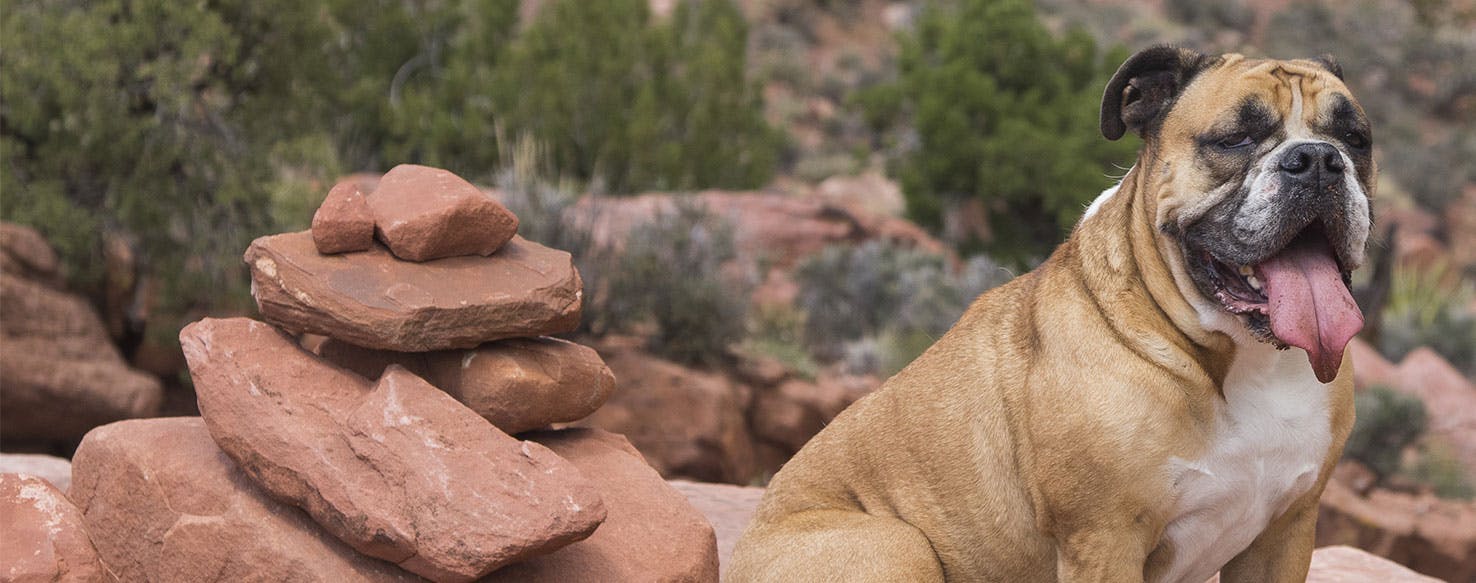- Home
- The Daily Wag!
- Behavior
- Why Bulldogs Chew Rocks
Why Bulldogs Chew Rocks

Unusual
Concerning
Introduction
Puppies will put just about anything that they can in their mouths, if given the chance. Dog owners have torn their hair out for years trying to figure out how to prevent their puppies from putting dangerous or filthy objects into their mouths, and if you have owned a dog since puppyhood, you can probably relate! When this habit persists into adulthood, it can be frustrating and even dangerous. This behavior seems common in Bulldogs of all varieties, who have a tendency to chew on things. This includes non-food items like rocks. Many Bulldog owners report that they have caught their Bulldogs chewing rocks at least once, but the behavior is not limited to Bulldogs alone. Here is why the behavior occurs, and how to prevent your Bulldog from injuring itself.
The Root of the Behavior
When puppies reach the age of four to five months, they go through a developmental phase called teething. During this time, their teeth are sensitive and usually bothersome. Bulldogs in particular seem to experience pain during teething, which can sometimes last up to six months. Teething is what drives chewing, gnawing, and biting behaviors in puppies. The behavior temporarily alleviates pain and inflammation, although bleeding in small amounts might occur. Anything that a puppy can chew on can become an impromptu chew toy, and this includes all manner of objects that you don’t want your Bulldog sinking its teeth into.
Rocks are a common object for several breeds of dogs to consume, including the Bulldog. When dogs eat non-food items like rocks as an adult, the term pica is used as an initial diagnosis. Pica is a term referring to any behavior involving dogs consuming non-food items. There could be several reasons for pica, and there are several theories behind the consumption of rocks in particular. Many speculate that consuming rocks is indicative of a vitamin and mineral deficiency, although veterinarians suggest that the behavior is more commonly liked to mental health issues. In Bulldogs, there seems to be more going on with biting than with other dog breeds.
A lot of Bulldogs, particularly the English Bulldog, are born with an underbite. This can cause problems over the course of a lifetime and perhaps revert adult dogs to the painful state that their mouths were in during teething. Other digestive, immune, and physical problems may be connected to the Bulldog’s apparent appetite for rocks. In fact, the English Bulldog has so many health problems that people are worried about the course of the breed’s future. Several of the recurring health issues surrounding the Bulldog breed make it a likely candidate for pain-related coping mechanisms, of which pica is one of the most common.
Need advice about your pet's health?
Get answers fast from a veterinary professional 24/7 in the Wag! App.
Get Vet ChatEncouraging the Behavior
Consuming rocks can be dangerous for the intestinal tract, and the behavior can lead to a whole new slew of health problems for your Bulldog to deal with. If your Bulldog eats or chews on rocks, you should be in contact with your veterinarian, who can help you determine whether or not your Bulldog is suffering from an underlying condition. Any deficiencies in the diet or intestines can lead to pica, and your veterinarian will help you rule these out if necessary. In the meantime, you can limit your dog’s access to rocks and seek out behavioral training to avert the behavior as much as possible.
A lot of Bulldogs seeking relief from toothache or pain might benefit from alternative chew toys or objects. If your Bulldog prefers rocks to chew toys, there is an easy alternative that might provide your dog some relief. Freeze a couple of damp rags and give them to your dog to see if he will chew on them. Bulldogs and teething puppies may like this activity more than chewing on chew toys, as the cold helps alleviate inflammation and dulls the pain. You should also consider adopting a daily teeth cleaning routine. Although most people brush their dog’s teeth only every once in a while, brushing a Bulldog’s teeth every day can help promote healthy gums and avoid dental problems in adulthood.
Other Solutions and Considerations
The English Bulldog in particular suffers from extensive health problems. In fact, many are concerned about the fate of the English Bulldog breed. It has gotten to the point where continuing to breed the dogs is leading to more and more critical health problems. Breathing issues, chronic pain, and any chronic symptoms may lead to both physical and mental distress in your dog. If pica arises as a result of an underlying medical condition, treatment of the condition should also stop the rock chewing habits. Otherwise, the problem may not have a direct resolution, and you may need to seek out behavioral training in order to redirect the behavior onto mentally healthy and physically safe stress-relieving activities.
Conclusion
Bulldogs are listed among the most popular dog
breeds of all time, and they are lovable, generally easy to raise dogs. Help
your Bulldog keep his teething habits in the past by keeping his teeth healthy
and watching out for any developing mental or physical health issues. Doing so
will make sure that your Bulldog learns that rock is a type of music, not a
food item.
Written by a Australian Shepherd lover Jonah Erickson
Veterinary reviewed by:
Published: 04/12/2018, edited: 01/30/2020
More articles by Jonah Erickson
